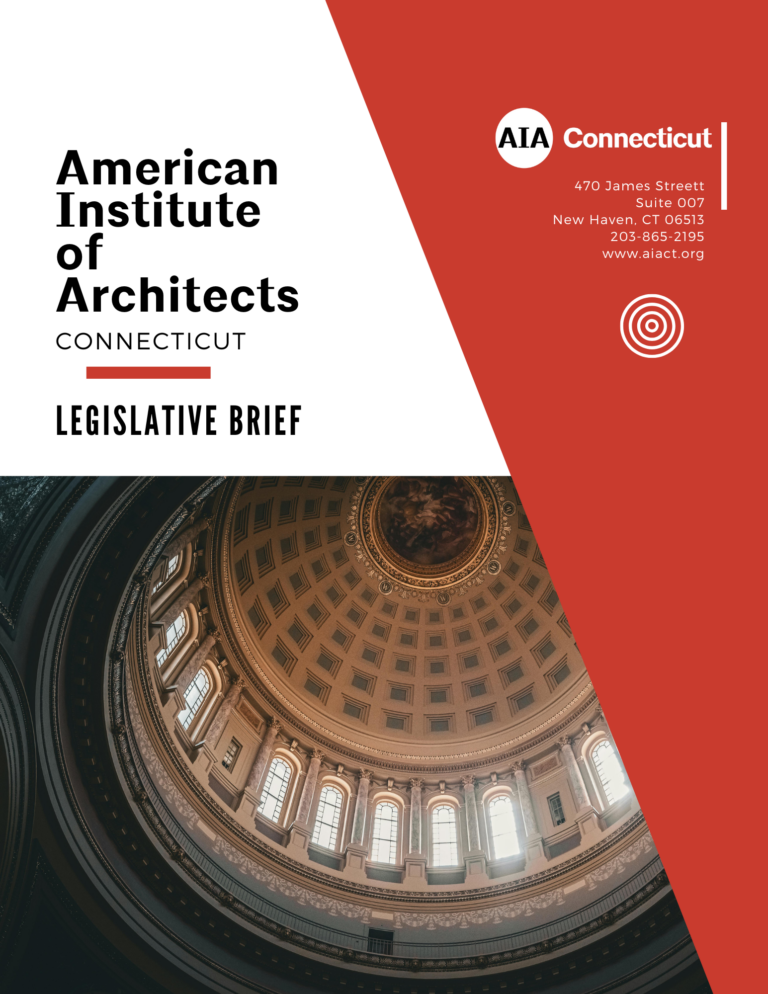Together, with our members, we advocate for architects, the profession, and the built environment at the federal, state, and local levels.
Our active representation on issues at the state legislature, with state agencies, and at the national level is vital to architects, such as licensing, architects’ contracts, building code requirements, sales tax, and various design- and construction-related issues.
Join the AIA Connecticut Government Affairs Committee!
This committee assists the AIA CT Executive Director by focusing on Connecticut legislative and licensing issues and encouraging member participation in local, state, and federal government.
2026 Co-Chairs:
John J. Butkus, AIA; Arcadis
Amy Samuelson, AIA, AIA CT Vice-President; The SLAM Collaborative
Gina Calabro, Hon. AIA CT; AIA CT Executive Director/CEO
Please email Gina Calabro for information and to join the Government Affairs Basecamp for updates.

Buildings generate nearly 40% of annual global Green House Gas emissions. Approximately two-thirds of the building area that exists today will still exist in 2050. Currently, building renovations affect only 0.5-1% of the building stock annually.
The sustainability, especially the energy efficiency, of the built environment depends on the quality of architectural design and construction. The energy use of new and renovated structures is primarily governed by the International Energy Code as adopted and modified by each state. States have begun to assess and implement additional energy conservation requirements but achieving them requires measures of compliance and enforcement that are challenging to regulate beyond the established work of CT Codes and Standards Committee. Given these challenges, the AIA 2030 Commitment (toward net zero energy buildings) compels its signatory member firms to design more energy efficient buildings.
Architects of AIA CT, as such, currently support the work of representatives from the public and private sectors (including the Governors Climate Change Council (GC3) and other non-profits) seeking widespread reductions of energy use throughout Connecticut.
Through our National Association and FEMA, architects receive certified training to assist in federal and state disasters as volunteers to assist towns and city building inspectors in evaluating post-disaster occupancy of buildings and homes.
In 2020, we were working with the Trial Lawyers Association and the Judiciary Committee to update the verbiage on the Connecticut “Good Samaritan Law” to include architects and engineers. In 2022, the language was in a separate bill, HB 5236: An Act Concerning Architects Who Voluntarily and Without Compensation Assist Public Officials in Evaluating the Safety Elements of Built Environments in the Aftermath of a Major Disaster or Emergency. The bill was signed into law by Governor Lamont in May 2022.
We will now work with the Connecticut Department of Emergency Management and Homeland Security (DEMHS) on a Memorandum of Understanding on what this assistance will entail.
In 2017, the American Institute of Architects declared through a resolution that access to housing is a “fundamental right.” In doing so, we recognize the importance of addressing the housing crisis and its impacts on social equity as one of the most difficult challenges facing America’s policymakers and shapers of the built environment.
The lack of affordable and safe housing results in many workers not having access to job markets within their own communities, lower-income households are being forced to locate farther from places of employment and, thereby encouraging blight, urban sprawl, and traffic congestion.
Architects are at the forefront of the challenges inherent to providing safe, healthy, and sustainable housing to all. The AIA advocates for governmental policies, programs, and incentives to promote the design, construction, renovation, rehabilitation, preservation, and stabilization of safe, healthy, affordable, sustainable, and disaster-resistant housing within the means of all people.
More than 137,000 people in CT are struggling to secure a safe, affordable home in a thriving, supportive community. Thousands of families simply want to live in a neighborhood full of opportunities that help their children thrive. With the widening and deepening affordable housing crisis, we need to build equitable housing and integrate communities. We support policies that promote prosperous, healthy and livable communities—places where housing, retail, schools, and employment are accessible to all.
When business thrives, America thrives. Architecture firms lead a $1T building construction industry that catalyzes private investment. Most of these firms meet the federal government’s definition of small business. The administration’s tax policies should support small business, innovation, and talent recruitment. AIA commits to voice strong support for a future economy that advances the success of architecture firms and the profession.
Human activity is warming our climate to dangerous levels and carbon from buildings is a primary culprit. Buildings must consume less energy, use only renewable sources, and contribute power back to the energy grid. AIA is taking action to eliminate all building carbon emissions by 2040.
In towns and cities across the country, deep inequities exist that prevent access to safe and healthy buildings for many Americans. We as a nation must act to provide shelter—a basic human need. AIA commits to a future built environment that improves individual health and prepares communities to weather a variety of storms.